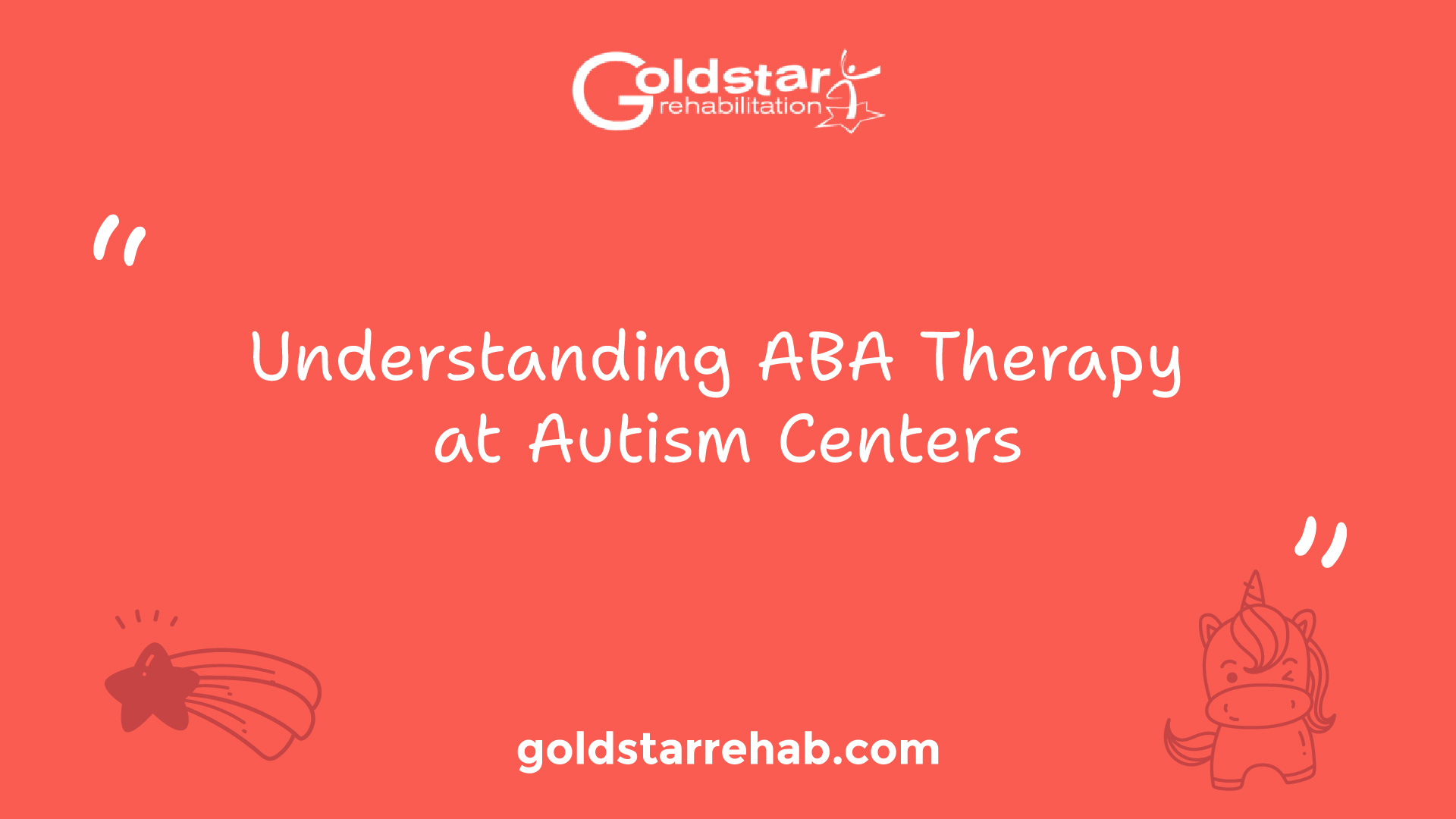Understanding ABA Therapy at Autism Centers
Discover how ABA therapy and autism centers can transform your child's development and foster growth.
Understanding ABA Therapy
Overview of ABA Therapy
Applied Behavior Analysis (ABA) therapy is a method designed to assist children on the autism spectrum in adapting to social situations they might find challenging. It employs interventions grounded in the principles of learning theory. These strategies focus on modifying behavior and enhancing social skills, making it easier for children to understand and navigate social environments.
ABA therapy emphasizes individualized learning plans that cater to each child's unique skills, needs, and interests. For instance, by incorporating tailored instruction and positive reinforcement, children can learn to engage more effectively and develop key life skills necessary for their daily interactions.
Key Features of ABA TherapyDescriptionIndividualized PlansGoals set based on the child's specific struggles.Positive ReinforcementEncouraging desired behaviors through rewards.Social Skills DevelopmentTeaching children how to navigate social interactions.

Benefits of ABA Therapy
The benefits of ABA therapy are numerous, as it allows for a personalized approach to each child's learning path. The goals are specifically designed to address the individual challenges faced by the child, making the intervention both relevant and effective.
By focusing on positive reinforcement and tailored instruction, ABA therapy not only aids in behavior modification but also enhances a child's overall developmental growth in various domains. This can include improvements in communication, social skills, and everyday life skills. Children are taught to build upon existing skills while also being encouraged to acquire new ones, which leads to better outcomes both socially and academically [2].
Benefits of ABA TherapyDescriptionTailored Learning ExperiencesIndividualized approaches that meet specific needs.Comprehensive Skill DevelopmentFocus on multiple areas, including academics and social skills.Enhanced Behavioral RegulationTeaching children to manage their reactions and behaviors in various situations.
ABA therapy is recognized for its effectiveness in guiding children towards achieving their potential while addressing specific behavioral challenges. For more information on programs and services related to ABA therapy, visit our sections on aba therapy and autism treatment programs and aba therapy and autism services.
Role of Behavior Analysts
Behavior analysts play a vital role in the implementation of ABA therapy at autism centers. They help children with autism by assessing behaviors, creating customized plans, and guiding treatment. Understanding their responsibilities and the distinction between different roles in ABA therapy can help parents navigate the services available for their children.
Responsibilities of BCBA
A Board Certified Behavior Analyst (BCBA) is a trained professional who specializes in behavior analysis. They are responsible for designing and overseeing ABA programs tailored to meet the unique needs of each child. Their key responsibilities include:
These professionals are integral in promoting positive behavior changes and addressing behavioral issues in children with autism, as highlighted by Autism Parenting Magazine.
BCBA vs. RBT
It's important for parents to understand the distinction between a BCBA and a Registered Behavior Technician (RBT). Here’s a simple comparison of their roles:
RoleDescriptionResponsibilitiesBCBABoard Certified Behavior AnalystDesigns, oversees, and customizes ABA programs. Provides advanced interventions and contributes to decision-making.RBTRegistered Behavior TechnicianImplements ABA therapy under the direction of a BCBA. Works directly with children to deliver interventions and gather data.
The BCBA holds a higher-level certification and is responsible for the overall therapeutic approach. In contrast, RBTs focus on direct implementation of therapy sessions and data collection. This clear division of responsibilities helps in providing comprehensive support for children receiving ABA therapy and autism services.
For parents seeking guidance on ABA, it’s beneficial to inquire about the qualifications and roles of professionals working with their child. This understanding can enhance confidence in the therapy process, ensuring that children receive the best possible support tailored to their needs. For more about the treatment programs available, explore our article on aba therapy and autism treatment programs.
Effectiveness of ABA Therapy
ABA therapy has shown remarkable effectiveness in helping children with autism gain essential skills needed for everyday life. Numerous research studies support the positive impact of this therapeutic approach, along with concrete outcomes that benefit children's social, communication, and daily living skills.
Research Studies on ABA
Extensive research underscores the benefits of intensive and long-term therapy through ABA principles. Over 20 studies indicate significant improvements in various areas, including intellectual functioning, language development, daily living skills, and social interactions for many children diagnosed with autism Brighter Strides ABA.
A summary of findings from notable studies is displayed below:
Study FocusOutcomeLong-term therapy durationA majority of children referred for ABA therapy typically remain in services for 12 to 24 months NCBI.Weekly therapy hoursChildren participating in 25 to 40 hours of ABA per week for one to three years show improvements in communication, social interaction, and life skills WebMD.Socialization and communicationABA-based interventions significantly enhance socialization, communication, and expressive language among children with autism NCBI.
Outcomes of ABA Therapy
The outcomes of ABA therapy are encouraging and provide parents with hope regarding their children's development. Children who engage in comprehensive ABA therapy experience gains in crucial life skills. Positive reinforcement techniques employed through ABA have proved invaluable in enhancing social skills, communication abilities, and adaptive skills while reducing maladaptive behaviors Total Care ABA.
The effectiveness of ABA therapy can be summarized as follows:
Outcome AreaImprovement IndicatorSocial SkillsDevelopment and enhancement of appropriate social interactionsCommunication SkillsImproved expressive and receptive language abilitiesAdaptive SkillsIncreased daily living skills and independenceMaladaptive BehaviorsReduction of challenging or disruptive behaviors
For parents seeking support for their children, evaluating the benefits of ABA may help inform decisions about treatment options. Resources on ABA therapy and autism services, as well as ABA therapy for behavioral health are readily available to assist families in finding suitable programs and interventions.
Starting ABA Therapy Early
Early intervention plays a vital role in enhancing the development of children diagnosed with autism. The sooner ABA therapy is started, the better the potential outcomes for the child's growth across various areas of functioning.
Importance of Early Intervention
Research indicates that starting ABA therapy at a young age, particularly before age four, leads to significant enhancements in development. Early intervention helps children improve their social and communication skills, which are crucial for their overall development.
The following table summarizes the key benefits of early intervention in ABA therapy:
BenefitDescriptionImproved CommunicationChildren often show marked improvements in their ability to communicate with others.Enhanced Social SkillsEarly intervention leads to better social interactions and understanding.Increased IndependenceABA therapy promotes skills that help children perform daily living tasks more independently.Better Academic PerformanceChildren tend to have improved academic results due to better engagement and learning capabilities.Long-Term OutcomesEarly starters generally experience more substantial gains in functioning over time.
Developmental Benefits
The benefits of engaging in ABA therapy early extend beyond immediate skills acquisition. More than 20 studies show that intensive and long-term therapy using ABA principles contributes to notable improvements in intellectual functioning, language development, daily living skills, and social functioning for many children with autism.
A study demonstrated that children attending ABA therapy for between 25 to 40 hours per week, over a period of one to three years, reported excellent outcomes, including gains in communication, social interaction, and essential life skills [1].
Children with initially lower adaptive levels can also make significant strides in their behavior and skills through early ABA therapy interventions, even if they have high service discontinuation rates [4]. By integrating ABA therapy early on, parents provide their children with critical support that shapes their future success.
For more information on therapy and services available, visit our resources on ABA therapy and autism services and ABA therapy for developmental disabilities.
Center-Based ABA Therapy
Center-based ABA therapy is a structured approach designed to assist children with autism spectrum disorder (ASD) in developing essential skills within a supportive environment. This section covers the organization of ABA centers and the vital role parents play in the therapy process.
Structure of ABA Centers
The arrangement of ABA centers is tailored to meet the unique needs of children with ASD. Programs typically include individualized treatment plans and one-on-one sessions that can last between 20 to 40 hours per week. The focus is on helping children develop vital social skills, communication abilities, and adaptive skills. Specific options may include full-day, part-time, or after-school sessions to accommodate different schedules and needs [5].
To illustrate the variety in structure, here is a simple breakdown of session options:
Program TypeTypical Hours per WeekFocus AreasFull-Day30 - 40Comprehensive skill developmentPart-Time15 - 25Targeted learning on specific skillsAfter-School10 - 20Reinforcing school-based learning
The specialized environment of ABA centers is designed to provide a consistent and effective setting for skill acquisition through positive reinforcement techniques employed by trained therapists.
Parental Involvement
Parents play an indispensable role in center-based ABA therapy. They not only select the appropriate program tailored to their child’s needs but also collaborate closely with therapists to develop customized treatment plans. This partnership is crucial for ensuring that therapy goals align with the family's expectations.
By supporting skill reinforcement at home, parents can help their children generalize the skills learned in therapy to everyday situations. This collaboration often leads to more successful outcomes and strengthens the child’s newly acquired skills. Resources and discussions on therapy techniques can be found in various aba therapy and autism resources.
Furthermore, parents can participate in training sessions to become familiar with the methods used by therapists. This empowers them to effectively support their child's learning and promotes consistency in implementation both during therapy and at home.
Center-based ABA therapy has demonstrated a high level of effectiveness in improving crucial areas such as social interactions and communication for children with ASD, while also reducing undesirable behaviors. The collaborative effort between parents and therapists enhances the overall therapeutic process, aiming for the best possible outcomes in a child’s development.
Professional Certification in ABA
A qualified therapist can make a significant difference in a child's experience with ABA therapy. Understanding the professional certification available in this field is essential for parents seeking the best options for their children.
BCBA Certification Requirements
To become a Board Certified Behavior Analyst (BCBA), a candidate must fulfill specific educational and practical experience requirements. Key components include:
In 2021, the average annual salary for Applied Behavior Analysts with BCBA certification was approximately $102,900. The presence of over 42,000 certificants reinforces the quality of ABA therapy services available [7].
CertificationRequirementsBCBAMaster’s degree, VCS, supervised experience, passing examBCaBABachelor’s degree, VCS, supervised experience, passing examRBT40-hour training program, background check, passing exam
Importance of Certification
Certification plays a vital role in ensuring that practitioners have the necessary skills and knowledge to provide effective treatment. Parents can feel more confident knowing that therapists who are certified have undergone rigorous training and have met established standards.
The Behavior Analyst Certification Board, Inc.®, established in 1998, offers several accredited programs recognized by the National Commission for Certifying Agencies (NCCA). This accreditation serves as a benchmark for quality, ensuring that individuals seeking services are receiving care from trained professionals. For additional information on how ABA therapy impacts children, refer to our resources on aba therapy and autism resources and aba therapy and autism treatment programs.
Parents can be assured that when they choose certified professionals, they are opting for quality support in their child's ABA therapy journey.
References
[1]: https://www.webmd.com/mental-health/what-is-applied-behavior-analysis
[2]: https://www.autismspeaks.org/applied-behavior-analysis
[3]: https://www.autismparentingmagazine.com/aba-principles/
[4]: https://www.ncbi.nlm.nih.gov/pmc/articles/PMC8702444/
[5]: https://www.totalcareaba.com/autism/center-based-aba-therapy/
[6]: https://www.brighterstridesaba.com/blog/aba-therapy-certification-requirements
[7]: https://www.bhcoe.org/2020/10/comparing-autism-aba-therapy-technician-certifications/
.png)



























